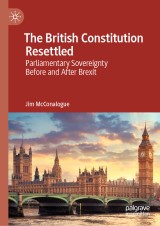Details

The British Constitution Resettled
Parliamentary Sovereignty Before and After Brexit|
90,94 € |
|
| Verlag: | Palgrave Macmillan |
| Format: | |
| Veröffentl.: | 17.07.2019 |
| ISBN/EAN: | 9783030252908 |
| Sprache: | englisch |
Dieses eBook enthält ein Wasserzeichen.
Beschreibungen
Adopting a political constitutionalist view of the British constitution, this book critically explores the history of legal and political thought on parliamentary sovereignty in the UK. It argues that EU membership strongly unsettled the historical precedents underpinning UK parliamentary sovereignty. Successive governments adopted practices which, although preserving fundamental legal rules, were at odds with past precedents. The author uses three key EU case studies – the financial transactions tax, freedom of movement of persons, and the working time directive – to illustrate that since 1973 the UK incorporated EU institutions which unsettled those precedents. The book further shows that the parliament’s place since the referendum on Brexit in June 2016 and the scrutinising of the terms of the withdrawal agreement constitute an enhanced, new constitutional resettlement, and a realignment of parliament with the historical precedent of consent and its sovereignty.<p></p>
<p>Chapter 1: The impact of EU membership on UK Government and Parliament’s sovereignty.- Chapter 2: Making sense of sovereignty, parliamentary sovereignty and the ‘rule of the recognised helm’.- Chapter 3: Eight historical constitutional forms – defining the rule of the present day ‘recognised helm'.- Chapter 4: Parliamentary sovereignty, the precedent of the mixed constitutional model and the UK’s membership of the EU.- Chapter 5: Parliamentary sovereignty, collective representation and EU membership.- Chapter 6: Parliamentary sovereignty, the EU free movement of persons and the precedent of fundamental rights provision.- Chapter 7: A Great Resettlement? Parliamentary sovereignty after Brexit.</p><p></p>
<p><b>Jim McConalogue</b> is a former senior parliamentary advisor to an MP in the House of Commons.</p>
<p>‘Parliamentary sovereignty is much talked about but rarely defined. In this major study Jim McConalogue examines different meanings of parliamentary sovereignty in changing historical contexts, and explores how leaving the European Union might enable an older view of parliamentary sovereignty to be recovered. An important and timely intervention.’</p>
<p></p><p><b>–Andrew Gamble</b>, Professor of Politics, University of Sheffield, UK</p>Adopting a political constitutionalist view of the British constitution, this book critically explores the history of legal and political thought on parliamentary sovereignty in the UK. It argues that EU membership strongly unsettled the historical precedents underpinning UK parliamentary sovereignty. Successive governments adopted practices which, although preserving fundamental legal rules, were at odds with past precedents. The author uses three key EU case studies – the financial transactions tax, freedom of movement of persons, and the workingtime directive – to illustrate that since 1973 the UK incorporated EU institutions which unsettled those precedents. The book further shows that the parliament’s place since the referendum on Brexit in June 2016 and the scrutinising of the terms of the withdrawal agreement constitute an enhanced, new constitutional resettlement, and a realignment of parliament with the historical precedent of consent and its sovereignty<p></p>
<p><b>Jim McConalogue</b> is a former senior parliamentary advisor to an MP in the House of Commons.</p>
<p></p><p><b>–Andrew Gamble</b>, Professor of Politics, University of Sheffield, UK</p>Adopting a political constitutionalist view of the British constitution, this book critically explores the history of legal and political thought on parliamentary sovereignty in the UK. It argues that EU membership strongly unsettled the historical precedents underpinning UK parliamentary sovereignty. Successive governments adopted practices which, although preserving fundamental legal rules, were at odds with past precedents. The author uses three key EU case studies – the financial transactions tax, freedom of movement of persons, and the workingtime directive – to illustrate that since 1973 the UK incorporated EU institutions which unsettled those precedents. The book further shows that the parliament’s place since the referendum on Brexit in June 2016 and the scrutinising of the terms of the withdrawal agreement constitute an enhanced, new constitutional resettlement, and a realignment of parliament with the historical precedent of consent and its sovereignty<p></p>
<p><b>Jim McConalogue</b> is a former senior parliamentary advisor to an MP in the House of Commons.</p>
Explains UK parliamentary sovereignty as the ‘rule of the recognised helm’ Defines parliamentary sovereignty from the thirteenth century through to the contemporary parliament Underpinned by historical rigour while also speaking to the changing contemporary climate
“Parliamentary sovereignty is much talked about but rarely defined. In this major study Jim McConalogue examines different meanings of parliamentary sovereignty in changing historical contexts, and explores how leaving the European Union might enable an older view of parliamentary sovereignty to be recovered. An important and timely intervention.” (Andrew Gamble, Professor of Politics, University of Sheffield, UK)

















